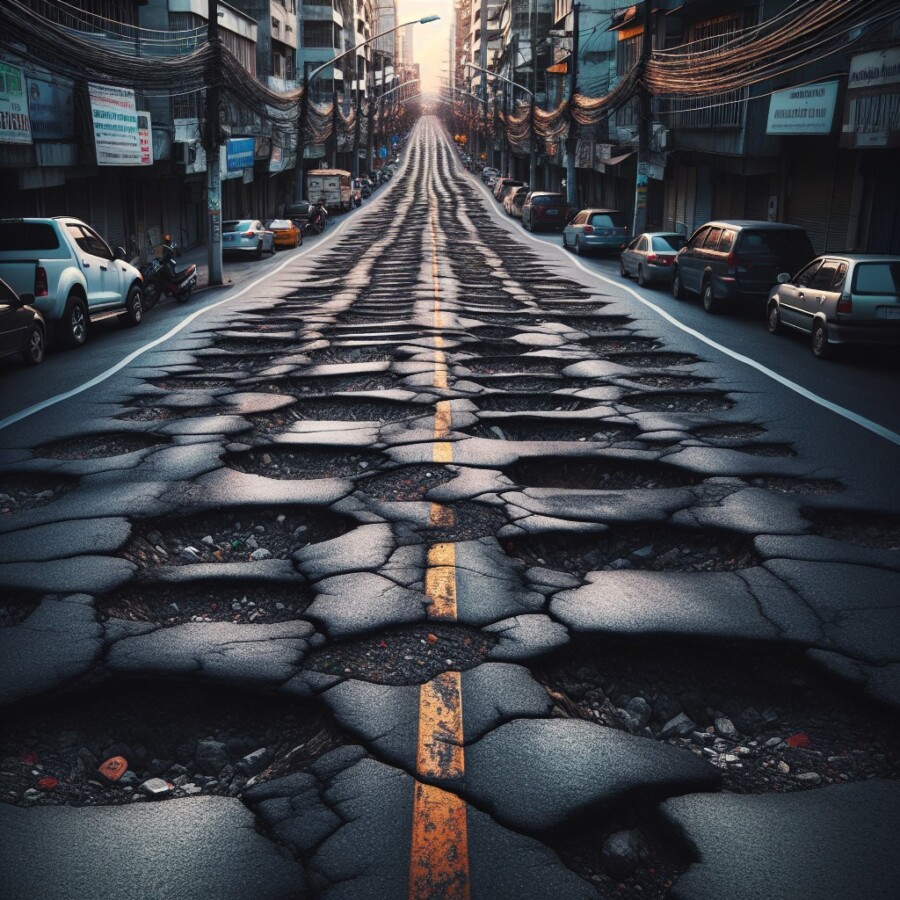In 2023, there were a lot of reports about potholes in the UK. This was the highest number in five years and it cost drivers around £500 million to fix their cars because of the damage caused by the potholes. Scientists say that climate change will make the problem worse because extreme weather will make the roads even more damaged. From January to November 2023, almost 630,000 potholes were reported to local councils in England, Scotland, and Wales. But there were probably even more potholes that weren’t reported because not all the councils gave their data.
Potholes are dangerous for drivers, cyclists, and pedestrians. The problem is getting worse because there isn’t enough money to fix all the potholes. The councils know about this and are trying to fix the £14 billion worth of road repairs that are needed. The Department for Transport is also going to spend £8.3 billion to improve local roads and fix over 5,000 miles of them.
Potholes aren’t just a problem for drivers, they’re also dangerous for cyclists. Scientists in the UK are trying to find new ways to fix the potholes. At the University of Cambridge, they’re working on projects like using digital maps to find potholes, making roads that can fix themselves, and using strong materials that can last a long time. They’re also looking into using robots to fix the potholes and making materials that can heal themselves.
Scientists are also trying out new ideas to fix the potholes and help with climate change. They’re testing out using certain plastics that can be used again and using geothermal energy to keep the roads at a good temperature. This will stop the roads from getting damaged when it freezes and thaws.
It’s clear that climate change is making the roads worse, so we need to do something about it. We need to improve how we take care of the roads, find new ways to fix them, and come up with plans to fight climate change. It’s important to invest in new and sustainable ways to make sure our roads are safe and last a long time.
Original news source: Pothole reports hit a five-year high in 2023 (BBC)
🎧 Listen:
Slow
Normal
Fast
📖 Vocabulary:
| 1 | reports | Official accounts or statements about something that has happened |
| 2 | climate | The usual weather conditions in a particular place or region |
| 3 | extreme | Going far beyond the ordinary or average, often in a severe or intense way |
| 4 | pedestrians | People who are walking, especially in an area where vehicles go |
| 5 | councils | Local government bodies responsible for the administration of a particular area |
| 6 | digital | Using or relating to technology that uses computer systems, software, and networks |
| 7 | materials | The substances or stuff from which things can be made |
| 8 | robots | Machines designed to carry out complex tasks automatically, often resembling humans or animals |
| 9 | geothermal | Related to the heat that comes from the earth’s interior |
| 10 | sustainable | Able to be maintained at a certain rate or level without harming the environment |
| 11 | invest | To put money, effort, or time into something to make it better or more successful |
| 12 | cyclists | People who ride bicycles |
| 13 | potholes | Holes in the road surface where the pavement has become broken or hollowed out |
| 14 | repairs | The act of making something that has been broken or damaged good again |
| 15 | damaged | Spoiled or impaired, usually by being broken or having a part that no longer works properly |
Group or Classroom Activities
Warm-up Activities:
– News Summary
Instructions: Have students read the article individually and then summarize the main points in their own words. They can then share their summaries with a partner or in small groups. Encourage them to use vocabulary and expressions from the article in their summaries.
– Opinion Poll
Instructions: Divide the class into pairs or small groups. Give each group a statement related to the article, such as “Investing in new technology is the best way to fix potholes.” Have students discuss the statement and share their opinions within their group. Then, conduct a class poll by asking each group to share their position and reasoning.
– Vocabulary Pictionary
Instructions: Write a list of vocabulary words from the article on the board. Divide the class into teams. One student from each team will come to the front of the class and choose a word. They must then draw a picture representing the word, while their team tries to guess the word. The team that guesses correctly gets a point. Continue until all the words have been guessed, or set a time limit.
– Headline Creation
Instructions: Ask students to work in pairs or small groups. Give each group a headline related to the article, such as “Pothole Problem: A Costly Challenge for UK Drivers.” Students must then create a news article or story based on the headline. Encourage them to use their imagination and incorporate information from the article as well.
– Think-Pair-Share
Instructions: Have students individually read the article and then think about the following question: “What can be done to address the issue of potholes and their impact on climate change?” After a few minutes, pair students up and have them discuss their ideas. Finally, bring the class back together and have a few pairs share their ideas with the whole group.
🤔 Comprehension Questions:
1. How much did it cost drivers in the UK to fix their cars because of the potholes in 2023?
2. Why do scientists think the problem of potholes will get worse in the future?
3. How many potholes were reported to local councils in England, Scotland, and Wales from January to November 2023?
4. Why are potholes dangerous for drivers, cyclists, and pedestrians?
5. How much money is needed to fix all the potholes in the UK?
6. What is the Department for Transport planning to do to improve local roads?
7. What are scientists at the University of Cambridge working on to fix potholes?
8. What are scientists testing out to help with climate change and prevent road damage?
Go to answers ⇩
🎧✍️ Listen and Fill in the Gaps:
In 2023, there were a lot of reports about potholes in the UK. This was the highest number in five years and it cost (1)______ around £500 million to fix their cars because of the damage caused by the potholes. Scientists say that climate (2)______ will make the problem worse because extreme weather will make the roads even more damaged. From January to (3)______ 2023, almost 630,000 potholes were reported to local (4)______ in England, Scotland, and Wales. But there were probably even more potholes that weren’t reported because not all the councils gave their data.
Potholes are dangerous for drivers, (5)______, and pedestrians. The problem is getting worse because there isn’t enough money to fix all the (6)______. The councils know about this and are trying to fix the £14 billion worth of road repairs that are (7)______. The Department for Transport is also going to (8)______ £8.3 billion to improve local roads and fix over 5,000 miles of them.
Potholes aren’t just a problem for drivers, they’re also dangerous for cyclists. (9)______ in the UK are trying to find new ways to fix the potholes. At the University of Cambridge, they’re working on projects like using digital maps to find potholes, (10)______ roads that can fix themselves, and using strong (11)______ that can last a long time. They’re also looking into using (12)______ to fix the potholes and making materials that can heal themselves.
Scientists are also trying out new ideas to fix the potholes and help with climate change. They’re testing out using certain plastics that can be used again and using geothermal (13)______ to keep the (14)______ at a good (15)______. This will stop the roads from getting damaged when it (16)______ and thaws.
It’s clear that climate change is making the roads worse, so we need to do something about it. We need to improve how we take care of the roads, find new ways to fix them, and come up with plans to fight climate change. It’s important to invest in new and sustainable ways to make sure our roads are safe and last a long time.
Go to answers ⇩
💬 Discussion Questions:
Students can ask a partner these questions, or discuss them as a group.
1. What are potholes and why are they dangerous?
2. Have you ever experienced driving or cycling on a road with potholes? How did it make you feel?
3. How do you think climate change can make the problem of potholes worse?
4. Do you think it’s fair for drivers to have to pay to fix their cars because of potholes? Why or why not?
5. What do you think the government should do to fix the problem of potholes?
6. How do you think using digital maps to find potholes can help solve the problem?
7. Do you think roads that can fix themselves are a good idea? Why or why not?
8. How do you feel about the idea of using robots to fix potholes? Do you think it would be effective?
9. What do you think about the idea of using materials that can heal themselves to fix potholes?
10. How do you think using certain plastics and geothermal energy can help with fixing potholes and fighting climate change?
11. Do you think it’s important to invest in new and sustainable ways to take care of roads? Why or why not?
12. How would you feel if the roads in your city were always in good condition and didn’t have any potholes?
13. Do you like the idea of using technology to improve the condition of roads? Why or why not?
14. What are some other ways you can think of to fix potholes and prevent damage to roads caused by climate change?
15. How important do you think it is to prioritize road repairs and find solutions to the problem of potholes? Why or why not?
Individual Activities
📖💭 Vocabulary Meanings:
Match each word to its meaning.
Words:
1. reports
2. climate
3. extreme
4. pedestrians
5. councils
6. digital
7. materials
8. robots
9. geothermal
10. sustainable
11. invest
12. cyclists
13. potholes
14. repairs
15. damaged
Meanings:
(A) The act of making something that has been broken or damaged good again
(B) Machines designed to carry out complex tasks automatically, often resembling humans or animals
(C) The substances or stuff from which things can be made
(D) Local government bodies responsible for the administration of a particular area
(E) The usual weather conditions in a particular place or region
(F) To put money, effort, or time into something to make it better or more successful
(G) Spoiled or impaired, usually by being broken or having a part that no longer works properly
(H) Related to the heat that comes from the earth’s interior
(I) People who ride bicycles
(J) Going far beyond the ordinary or average, often in a severe or intense way
(K) Able to be maintained at a certain rate or level without harming the environment
(L) People who are walking, especially in an area where vehicles go
(M) Holes in the road surface where the pavement has become broken or hollowed out
(N) Using or relating to technology that uses computer systems, software, and networks
(O) Official accounts or statements about something that has happened
Go to answers ⇩
🔡 Multiple Choice Questions:
1. What was the highest number of potholes reported in the UK in 2023?
(a) 500,000
(b) 630,000
(c) 1 million
(d) 5 million
2. How much did it cost drivers to fix their cars due to pothole damage in 2023?
(a) £500 million
(b) £1 billion
(c) £100 million
(d) £10 million
3. Why will climate change make the pothole problem worse?
(a) Climate change doesn’t affect the roads.
(b) Climate change will make the roads smoother.
(c) Potholes will disappear due to climate change.
(d) Extreme weather will damage the roads even more.
4. How much money is needed to fix all the potholes in the UK?
(a) £5 billion
(b) £1 billion
(c) £14 billion
(d) £100 million
5. How much money will the Department for Transport spend to improve local roads?
(a) £1 billion
(b) £8.3 billion
(c) £100 million
(d) £10 million
6. What are scientists at the University of Cambridge working on to fix potholes?
(a) Making roads that can fix themselves
(b) Using strong materials that can last a long time
(c) All of the above
(d) Using digital maps to find potholes
7. What are scientists testing out to help fix potholes and fight climate change?
(a) Using geothermal energy to keep roads at a good temperature
(b) Both (a) and (b)
(c) Using certain plastics that can be used again
(d) None of the above
8. What is the main message of the article?
(a) Climate change is making the roads worse, so we need to find new ways to fix them and fight climate change.
(b) Potholes are not dangerous and do not need fixing.
(c) The UK has the best roads in the world.
(d) Potholes are only a problem for drivers, not cyclists or pedestrians.
Go to answers ⇩
🕵️ True or False Questions:
1. Scientists predict that climate change will worsen the pothole problem due to extreme weather conditions.
2. In 2023, there was a significant decrease in pothole reports in the UK compared to the previous five years.
3. Efforts are being made to address the issue, with the Department for Transport allocating £8.3 billion to improve local roads and repair over 5,000 miles of them.
4. There were likely even fewer unreported potholes as all councils provided their data.
5. Potholes do not pose a danger to drivers, cyclists, and pedestrians.
6. Between January and November 2023, less than 630,000 potholes were reported to local councils in England, Scotland, and Wales.
7. Insufficient funds contribute to the worsening pothole problem as there is not enough money to fix them all.
8. The damage caused by potholes cost drivers approximately £500 million to repair their cars.
Go to answers ⇩
📝 Write a Summary:
Write a summary of this news article in two sentences.
Check your writing now with the best free AI for English writing!
Writing Questions:
Answer the following questions. Write as much as you can for each answer.
Check your answers with our free English writing assistant!
1. What is the problem with the roads in the UK that is costing drivers a lot of money?
2. Why do scientists think that climate change will make the problem with the roads even worse?
3. How many potholes were reported to local councils in England, Scotland, and Wales from January to November 2023?
4. Why are potholes dangerous for drivers, cyclists, and pedestrians?
5. What are some of the new ideas that scientists are trying out to fix the potholes and help with climate change?
✅ Answers
🤔✅ Comprehension Question Answers:
1. How much did it cost drivers in the UK to fix their cars because of the potholes in 2023?
It cost drivers around £500 million to fix their cars because of the potholes.
2. Why do scientists think the problem of potholes will get worse in the future?
Scientists think the problem of potholes will get worse in the future because climate change will make the roads even more damaged due to extreme weather.
3. How many potholes were reported to local councils in England, Scotland, and Wales from January to November 2023?
Almost 630,000 potholes were reported to local councils in England, Scotland, and Wales from January to November 2023.
4. Why are potholes dangerous for drivers, cyclists, and pedestrians?
Potholes are dangerous for drivers, cyclists, and pedestrians because they can cause accidents and injuries. They can damage vehicles and cause cyclists and pedestrians to lose balance or trip.
5. How much money is needed to fix all the potholes in the UK?
£14 billion worth of road repairs are needed to fix all the potholes in the UK.
6. What is the Department for Transport planning to do to improve local roads?
The Department for Transport is planning to spend £8.3 billion to improve local roads and fix over 5,000 miles of them.
7. What are scientists at the University of Cambridge working on to fix potholes?
Scientists at the University of Cambridge are working on projects like using digital maps to find potholes, making roads that can fix themselves, using strong materials that can last a long time, and using robots to fix the potholes.
8. What are scientists testing out to help with climate change and prevent road damage?
Scientists are testing out using certain plastics that can be recycled and used again, as well as using geothermal energy to keep the roads at a good temperature. This will prevent the roads from getting damaged when it freezes and thaws.
Go back to questions ⇧
🎧✍️✅ Listen and Fill in the Gaps Answers:
(1) drivers
(2) change
(3) November
(4) councils
(5) cyclists
(6) potholes
(7) needed
(8) spend
(9) Scientists
(10) making
(11) materials
(12) robots
(13) energy
(14) roads
(15) temperature
(16) freezes
Go back to questions ⇧
📖💭✅ Vocabulary Meanings Answers:
1. reports
Answer: (O) Official accounts or statements about something that has happened
2. climate
Answer: (E) The usual weather conditions in a particular place or region
3. extreme
Answer: (J) Going far beyond the ordinary or average, often in a severe or intense way
4. pedestrians
Answer: (L) People who are walking, especially in an area where vehicles go
5. councils
Answer: (D) Local government bodies responsible for the administration of a particular area
6. digital
Answer: (N) Using or relating to technology that uses computer systems, software, and networks
7. materials
Answer: (C) The substances or stuff from which things can be made
8. robots
Answer: (B) Machines designed to carry out complex tasks automatically, often resembling humans or animals
9. geothermal
Answer: (H) Related to the heat that comes from the earth’s interior
10. sustainable
Answer: (K) Able to be maintained at a certain rate or level without harming the environment
11. invest
Answer: (F) To put money, effort, or time into something to make it better or more successful
12. cyclists
Answer: (I) People who ride bicycles
13. potholes
Answer: (M) Holes in the road surface where the pavement has become broken or hollowed out
14. repairs
Answer: (A) The act of making something that has been broken or damaged good again
15. damaged
Answer: (G) Spoiled or impaired, usually by being broken or having a part that no longer works properly
Go back to questions ⇧
🔡✅ Multiple Choice Answers:
1. What was the highest number of potholes reported in the UK in 2023?
Answer: (b) 630,000
2. How much did it cost drivers to fix their cars due to pothole damage in 2023?
Answer: (a) £500 million
3. Why will climate change make the pothole problem worse?
Answer: (d) Extreme weather will damage the roads even more.
4. How much money is needed to fix all the potholes in the UK?
Answer: (c) £14 billion
5. How much money will the Department for Transport spend to improve local roads?
Answer: (b) £8.3 billion
6. What are scientists at the University of Cambridge working on to fix potholes?
Answer: (d) Using digital maps to find potholes
7. What are scientists testing out to help fix potholes and fight climate change?
Answer: (c) Using certain plastics that can be used again
8. What is the main message of the article?
Answer: (a) Climate change is making the roads worse, so we need to find new ways to fix them and fight climate change.
Go back to questions ⇧
🕵️✅ True or False Answers:
1. Scientists predict that climate change will worsen the pothole problem due to extreme weather conditions. (Answer: True)
2. In 2023, there was a significant decrease in pothole reports in the UK compared to the previous five years. (Answer: False)
3. Efforts are being made to address the issue, with the Department for Transport allocating £8.3 billion to improve local roads and repair over 5,000 miles of them. (Answer: True)
4. There were likely even fewer unreported potholes as all councils provided their data. (Answer: False)
5. Potholes do not pose a danger to drivers, cyclists, and pedestrians. (Answer: False)
6. Between January and November 2023, less than 630,000 potholes were reported to local councils in England, Scotland, and Wales. (Answer: False)
7. Insufficient funds contribute to the worsening pothole problem as there is not enough money to fix them all. (Answer: True)
8. The damage caused by potholes cost drivers approximately £500 million to repair their cars. (Answer: True)
Go back to questions ⇧














